Apple, can you do for video what you did for music -- perhaps saving us all from NBComcast?

Last month's rumors about Apple talking to networks and Hollywood about TV show subscriptions got me thinking about what CEO Steve Jobs & Co. should do for making video content more accessible. I'm musing even harder today, given the pending announcement that Comcast will buy NBC Universal. The deal should have wide-ranging impact for cable and online TV content and companies that distribute it -- everyone from Hulu to Apple.
Now would be a really good time for Apple to rethink its video content strategy and make changes that will hold what I'm unaffectionately calling NBComcast at bay. Since I'm in one of my know-it-all moods, I'd like to offer a few suggestions to Apple. It's time for Apple to leverage its strengths by offering something like "Complete My Album" or "Upgrade to iTunes Plus" for movies, TV shows and music videos. Such iTunes features could change how people electronically rent or buy video content.
Five compact digital camera myths and realities
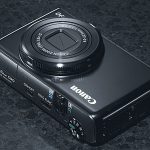
The holidays are fast approaching and geek gift shopping with it. This year I will post several shopping primers for making the best decisions in buying tech gear. This first installment is about compact digital cameras and what features do and don't matter. It's particularly important because geeks used to buying PCs might wrongly think that more of this or that matters for digicams. Misplaced emphasis on the wrong features can lead to disappointing purchases.
Some background: I'm no professional photographer, but I do know digital photographic gear. I bought my first digital camera in 1997, the 1-megapixel Kodak Digital Science D120 (OK, I didn't know better). The D120 was one of the first 1-megapixel compact digicams selling for (barely) under $1,000. I purchased additional compacts from Canon, Kodak, Olympus and Sony over the next couple of years, but no compact satisfied until the 3.3-megapixel Canon PowerShot S20 in summer 2000. I got plenty of use from the S20, including shooting the opening of the first Apple Store in May 2001.
Microsoft's 'Black Screen of Death' denial solves the blame not the problem

Microsoft's response to the so-called "Black Screen of Death" problem is a throwback to an older and equally ineffective strategy -- what I have called "security by PR." Rather than managing the problem, Microsoft is managing the reaction. That simply is the wrong approach to quality customer service or instilling users with confidence about using Windows. With Windows 7 only in market for about six weeks and the holiday sales season just started, the company's priority should be fixing the problem rather than denying culpability.
Recap: Some Windows users are complaining of a Black Screen of Death (KSoD), where the operating system essentially fails to fully load at startup. KSoDs aren't new, but there have been recent reports suggesting an increasing number starting in mid November. Last week, British security firm Prevx claimed that November 10 Microsoft security updates caused recent KSoDs. However, in a late-day blog post yesterday, Prevx backed away from its assertion:
My Windows 7 confession (and why you should confess, too)

They say that confession is good for the soul -- or the mind. I'll make mine but insist that you read no further unless you're willing to make yours in comments. Deal?
My confession is the real reason for running Windows 7. In September, I wrote "Why I chose Windows 7 over Snow Leopard (and why you should, too)." In that post, I explained about Windows 7 being my primary operating system since January on two different Sony VAIO notebooks (I see from comments how many Betanews readers remember the Sony rootkit and just love the company for it). As I explained in that post, two primary reasons led to my picking the newer version of Windows over Mac OS X: Windows 7's fresh, new user interface and VAIO Z720 hardware features -- mainly higher-resolution display -- compared to 13-inch MacBook Pro. But neither of these reasons is why I stuck with Windows 7, even for the productivity gains realized from using the operating system over Mac OS X Snow Leopard.
Where did Apple's Black Friday sales go?

Yesterday, Piper Jaffray analyst Gene Munster issued a report indicating that brick-and-mortar Apple stores sold 8.3 Macs per hour on Black Friday versus 13 per hour in 2008. Will Macs sales really be down this holiday and could it be because of, gasp, Windows 7?
Microsoft and its PC partners didn't have anything really new to offer consumers last holiday season. Macs had -- and still have -- a newness for many holiday shoppers, the majority of which already use Windows PCs at home or work. The only real barrier to buying a Mac during Holiday 2008 was price: Spending $1,000 or more. Same barrier remains this year.
Windows desktops and notebooks reach near price-performance parity for Holiday 2009

Historically, Windows portables sold for considerably more than desktops, while delivering less performance or features. This holiday season, prices will be closer than ever -- and, aside from netbooks, there will be little significant difference in performance for price. The question: If prices are about the same, who wouldn't buy a notebook for portability over a desktop? Further: At what point should desktops go the way of the dodo?
At U.S. retail in October, the average selling price for a Windows portable PC was $519, just $28 more than desktops, according to NPD. A year earlier, the portable ASP was $659 and $556 for desktops. Windows desktop and portable ASPs could grow even closer, as super low-cost netbooks continue sales gains. Go back a few years and the gulf between desktops and portables is greater -- as is the ASP. According to Merrill Lynch, in 2006, the portable ASP was $1,160 and $775 for desktops (high Mac ASPs inflate these numbers, which are for the whole PC market not just Windows).
Is Microsoft Store just a cheap Apple Store rip-off?

Yesterday, Black Friday 2009, I drove 70 miles north from San Diego to Mission Viejo, Calif. My goal: To answer that question. In October, Microsoft opened two retail outlets, in Arizona and California, that do remind of Apple Store.
Tech bloggers, particularly those in the Mac camp, have repeatedly slammed Microsoft for imitating Apple and doing so badly. But as the saying goes, imitation is the best form of flattery -- and imitation is quite common in retail.
Nearly half the money spent at US retail on desktop PCs goes to Apple
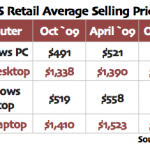
In October, Mac US retail desktop computer revenue share was 47.71, percent up from 33.44 percent a year earlier, according to NPD. It's a stunning number, given just how many Windows PC companies combined command so much more market share, while competing for the same revenue share.
NPD measures in-store and online sales to compile the numbers. Contrary to blogs or news sites that will link to this post, NPD did not issue a report with this data. I asked for it. That's what reporters do -- ask questions.
Can you come up with a better brand for AOL than 'Aol.'?

The new, much maligned "Aol." logo has upped its failworthiness. Newest buzz: A 27-year-old with no marketing expertise was the driving force behind AOL becoming Aol.; that has many people wondering what the company was thinking.
Age isn't so much concern as lack of marketing expertise. What was AOL thinking, particularly with the rebranding being so important to a company spinoff planned for early December?
AOL's decision to rebrand as Aol. takes a bad brand and makes it worse
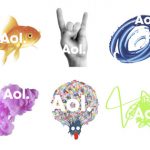
Not since AT&T gobbled up Cingular and rebranded as at&t with that ugly Death Star-like logo has a company erred so far from sensibility. The new AOL brand, Aol., is coming soon to frighten you. AOL's attempt to be hip is anything but. Not that AOL, distributor of a billion CD coasters, was ever cool. The service may have been the biggest online community of the 1990s, but it was never hip. Nor will the lame rebranding make it so.
AOL previewed the new brand identity overnight ahead of its unveiling on December 10th, for the company's spin-off from Time Warner. By measure of big tech sites and Twitter, the rebranding is a total fail before even being officially launched.
Uh-oh, netbooks -- not Windows 7 -- will lift 2009 PC sales
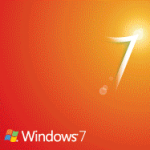
Gartner is just full of bad news that will suck Windows PC manufacturers' thanks out of American Thanksgiving -- and Christmas along with it. Ho Ho Ho Ba Humbug. Today, the analyst firm predicted that based on fourth-quarter PC shipment estimates, for 2009, the market would grow -- but not because of Windows 7 -- and with deep declines in average selling prices. Combined, the latter two predictions spell lower profits for Windows PC OEMs and potentially overshipment of PCs for holiday 2009.
"We just don't see consumers buying new PCs solely because of Windows 7," Gartner research director George Shiffler said in a statement. "We are expecting a modest bump in fourth-quarter consumer demand as vendors promote new Windows 7-based PCs, but the attraction will be the new PCs, not Windows 7."
10 things about Microsoft's PDC 2009: The good, the bad and the ugly
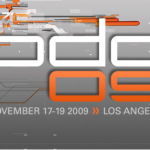
Microsoft's 2009 developer conference wrapped up yesterday in Los Angeles. Not since PDC 2003 has Microsoft talked so much and said so little. As I listened to the keynotes and have reviewed the sessions, words "series finale" repeatedly popped into my head -- like a TV show coming to its end after a long run. Good or bad for Microsoft, a computing era is ending. Perhaps PDC 2009 demarcates the transition.
PDC 2003 was memorable for demos that wooed but seemed insubstantial. Within weeks after that developer conference, I began telling my clients (I was a senior analyst for JupiterResearch then) to expect Microsoft to delay Windows Longhorn sometime in early 2004. The delay came, followed by several others, as Microsoft dumped features to get Windows Vista out the door -- late -- missing holiday 2006.
Microsoft gives free laptops to PDC 2009 attendees
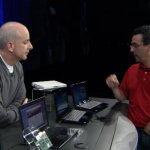
Windows 7 took the Professional Developer Conference stage this morning in the guise of Steven Sinofsky, president of Microsoft's Windows & Windows Live division. Sinofsky stood before the crowd of Microsoft developers as a victor. Last month, his team released Windows 7 nearly flawlessly and to generally positive reviews (PDC Day 2 live blog).
Sinofsky did not pitch a three-screen strategy -- PC, TV and mobile device -- as I expected based on statements Ray Ozzie, Microsoft's chief software architect, made during the Day 1 keynote. For PDC, Microsoft is missing one screen. The company doesn't plan to announce its next-generation Windows Phone -- or Windows Live, for that matter -- until next year's MIX conference.
Windows Azure opens for business on Jan. 1, 2010

This morning, Microsoft kicked off its 2009 Professional Developer Conference in Los Angeles. Typically, Microsoft times PDC around new operating systems that are testing and launching in the near future. Windows 7 and Windows Server 2008 R2 launched less than a month ago. So what operating is left? Windows Azure Platform (Day 1 Live Blog).
Ray Ozzie, Microsoft's chief software architect, took the keynote stage in typical fashion. Ozzie is a brainy type, who talks like his head is in the clouds, which is perhaps appropriate for someone laying out Microsoft's cloud computing strategy. He introduced the world to Azure Services Platform a year ago, during PDC 08. Today, he added when to why, what and where about what Microsoft now calls the Windows Azure Platform.
Apple was NOT more profitable selling cell phones than Nokia in Q3
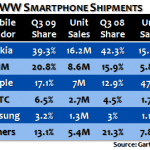
For days, I've read blogs and news stories misstating Apple's cell phone profitability compared to Nokia. Headlines range from the AppleBlog's "Apple Surpasses Nokia as Most Profitable Cell Phone Maker" to Reuters' "Apple tops phone chart as Nokia, Samsung step up" to Silicon Alley Insider's "Apple's iPhone Operating Profit Beats Nokia For The First Time," among, many, many others. As good as this feat sounds for Apple -- profit share beating market share -- every one of these stories is wrong. Right, everyone is wrong.
Three days ago, Strategy Analytics released report "Apple Becomes World's Most Profitable Handset Vendor in Q3 2009," written by Alexander Spektor. I contacted Spektor this morning for clarification on the report or for an actual copy. He hasn't yet responded. So I have to go by all the misreporting.
Joe's Bio
Joe Wilcox is BetaNews executive editor. His motto: Change the rules. Joe is a former CNET News staff writer, JupiterResearch senior analyst, and Ziff Davis Enterprise Microsoft Watch editor.
Ethics StatementBetaNews, your source for breaking tech news, reviews, and in-depth reporting since 1998.
© 1998-2025 BetaNews, Inc. All Rights Reserved. About Us - Privacy Policy - Cookie Policy - Sitemap.
